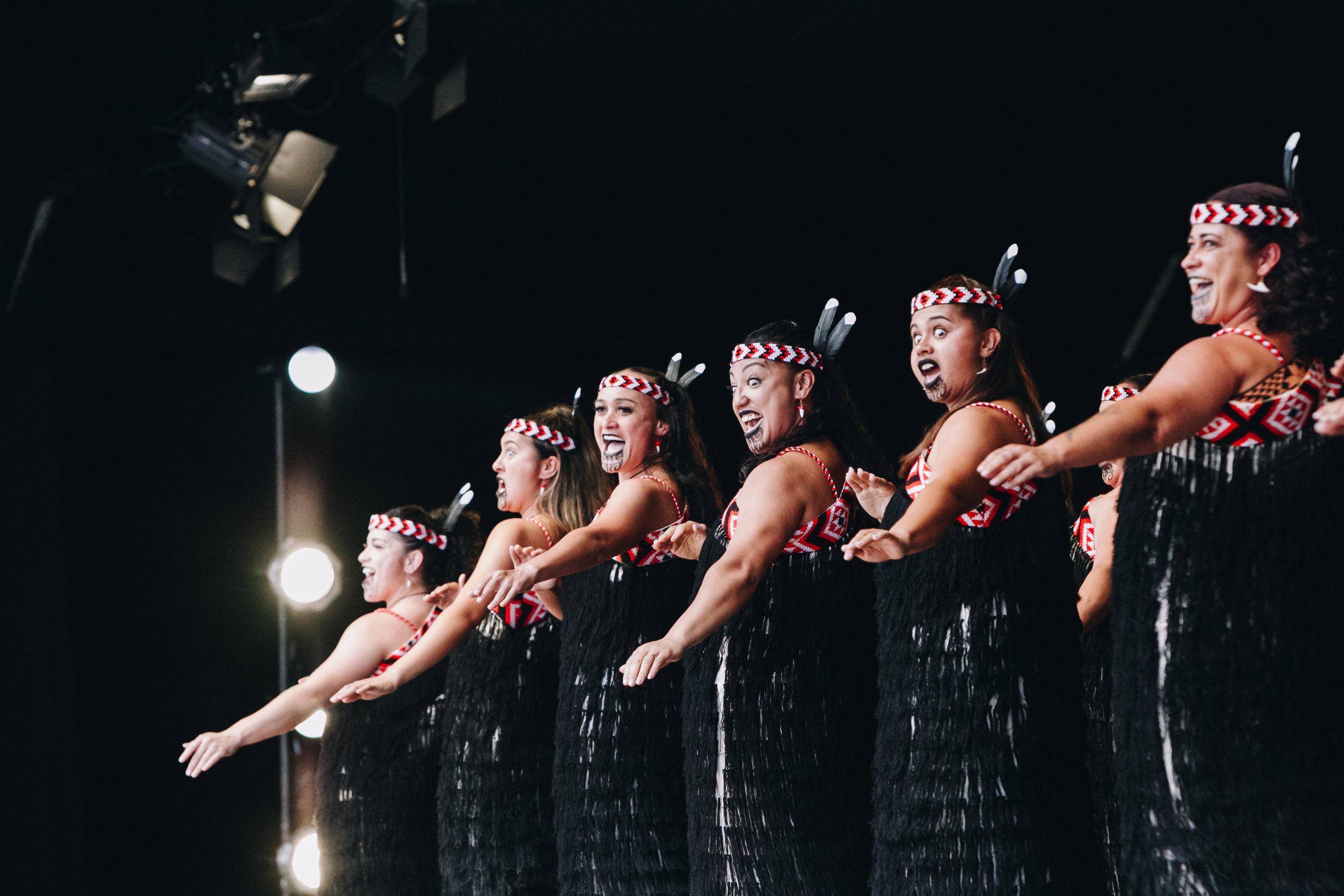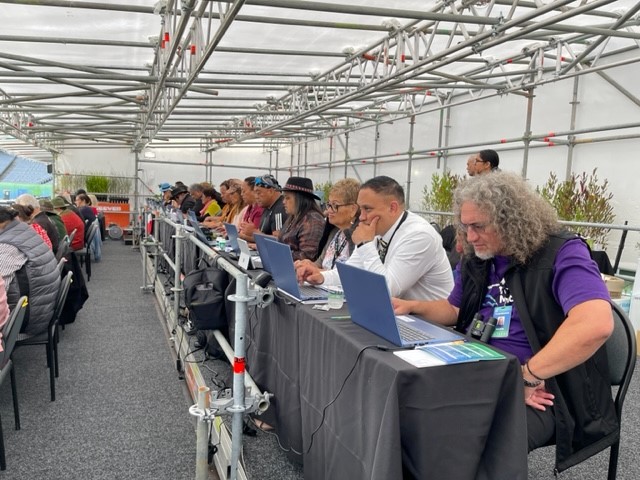When Te Matatini decided to transition to an entirely digital judging system for its esteemed national kapa haka competition, it had no idea that Cyclone Gabrielle would hit just days before it was due to go live. Delivering a new Azure-based digital platform “blind” with communications down at its Gisborne headquarters was a huge test for Toro Technology, especially with the eyes of Aotearoa on the country’s most significant cultural festival. Thanks to seamless planning, a resilient platform and even more resilient attitudes, the event was a huge success!
Te Matatini is known across Aotearoa as one of the biggest events in the country’s calendar. Every second year, thousands of performers, friends, fans and whānau come together to celebrate Māori performing arts and compete in the world’s most prestigious kapa haka competition.
When the festival was first held in 1972, titled the New Zealand Polynesian Cultural Festival, it involved just 23 performance groups. Fast forward to today and this has more than doubled, with TVNZ announcing a viewership of over 2 million people either in person or online. As the competition has evolved, Te Matatini realised its processes needed to evolve as well, particularly when it came to judging. For almost 50 years, Te Matatini had been using a rigorous paper-based judging process. But with the number of contestants growing every year, judging had become a lengthy process, causing delays getting feedback to the contestants.
Going digital would clearly make things quicker – but not if that risked the integrity of the competition getting lost in the transition. It was important the tech company Te Matatini worked with understood the significance of the event and their ways of working.
A shared journey
With an industry-leading team who shared a deep understanding of tikanga and ways of working collaboratively, Toro Technology felt like the appropriate fit. Toro Technology was also renowned for its cutting-edge technology – hence the name Toro, an ancient East Coast Māori term for the scouting party that goes ahead of the war party group and forges a new path forward.
Before they even began building the system, it was important Toro Technology understood the complex judging systems and criteria, and the organisation’s core values, so these could be integrated into the digital platform. Over the course of the next three months, Toro Technology worked closely with Te Matatini via many kōrero and planning sessions to develop a solution that allowed the judges to maintain their approach to judging and their values while getting the job done faster.
The solution they landed on was to build a judging platform from scratch on Azure. Given the significance of the event, they needed a system they could rely on – and with its high availability, Azure would ensure the judging platform was robust and accessible throughout the competition.
Having used it to deliver multitudes of projects, the team also had high trust in the cloud platform.
“Whenever we build application platforms, Azure is our go-to computing software. Our development team is constantly innovating and so they require technology that is doing the same. The high-end tooling that the Azure platform provides enables us to deliver the most cutting-edge solutions out there,” says Toro Head of Technology, Matiu Oakley.
In true Toro Technology fashion, the team brought the entire Te Matatini whānau on the journey with them, helping them to up-skill on digital technologies along the way through regular training sessions.
The show must go on!
By February 2023, Te Matatini and Toro Technology were ready and excited to kick off the competition. Then, just one week out from the event, Aotearoa was hit with the worst cyclone in decades. Cyclone Gabrielle tore through the North Island, leaving a trail of destruction and devastation in its wake.
Based in Gisborne, the Toro Technology headquarters was completely cut off from its communication lines. Without power or service, the team had no idea what was going on, or how the event crew were faring. Not knowing what the road ahead would hold, or if the technology and networks in Auckland would have survived unscathed, the Toro Technology team loaded their vehicles with more than 50 laptops and made the journey up north to ensure they were ready to help keep the festival going.
“When we finally arrived, we were welcomed with open arms from Te Matatini, but we didn’t know if the performers were even going to be able to make it! We had also missed out on the regional competition that we would typically use as a warm-up for this event due to Covid cancellations, but we remained confident” said Toro Technology co-founder, Barry Soutar.
On the morning of 22 February 2023, the atmosphere at Eden Park was filled with both nerves and excitement as the judges prepared to see the country’s top kapa haka performers. Some of the judges appeared to be as nervous as the teams and anxious to see the tech system perform well on the day. The eyes of the nation were equally focused on them.
They needn’t have worried. Despite the challenges along the way, Te Matatini 2023 was a huge success!
Toro Technology’s platform took a traditional team of 26 judging support personnel and reduced it to three, it made an 8-hour certification process of the results possible in minutes and increased the accuracy rating from around 60% to 100% in terms of the results that needed to be verified. When multiple judges came to thank Barry and Toro Head of Technology, Matiu Oakley, saying “we never want to go back to paper”, they knew they had fulfilled their role.
“It was incredible to be embedded into such a significant cultural event and to have the privilege of being part of a substantial change to Te Matatini. The experience of being through the process and supporting judges on the day was incredible, and the opportunity to be part of something that special doesn’t come around often,” says Matt.
Dan Walker, Global Co-Chair of Indigenous at Microsoft New Zealand, says the way Toro used Azure cloud technology to deliver such results for Te Matatini also carried special importance for him as a fellow Māori working in the industry.
“The success of this project, even amidst unforeseen challenges like Cyclone Gabrielle, is a testament to the resilience and vision of the Toro and Te Matatini teams and I’m delighted by what they’ve achieved together. It makes me very proud to see how an Azure-based platform is helping modernise and future-proof an event of such significance to Māori while upholding its mana and values. For me, one of the most exciting things about modern technology is how it can be used to support language and culture, strengthening our bonds with our heritage and with each other as people,” he says.
Creating a taonga for the future
After experiencing the benefits of the online judging platform, and Azure, Te Matatini could see the opportunities for digital transformation going further in the society. Among a raft of potential innovation projects to consider is to streamline the judging process even further including the creation of a cultural repository of the Māori language within performing arts.
One of the most time-consuming elements of the judging process is writing the beautiful commentary for the teams to take home. This is a cultural artefact that will be passed down and read by future generations, so it’s important the best language is used. To add to this, the words used in judging today are a combination of traditional and modern terms, so there is no common syntax across the judging materials.
By analysing the 50 years of language in Te Matatini records, Toro Technology is able to generate a lexicon of performing arts terms in Māori, which Te Matatini could use to support judges and help make the commentary-writing process more efficient.
“When one of the judges approached me about this potential project, they weren’t sure how long something like this would take. After all, there’s 50 years’ worth of language to analyse. But now, thanks to AI, what we dreamt of 20 years ago is possible in one tenth of the time and within a revised budget,” said Barry.
In keeping with its mission to uplift Māori culture and people, Toro has even bigger plans. Barry, Matiu and their team are committed to turning Gisborne into the next tech hub, to enable young people in the region to stay, train and pursue skilled careers where they live. Toro Technology has multiple training initiatives under way to make this a reality. Alongside this, it has a team dedicated to helping Iwi across Aotearoa create digital twins of their marae, so should anything happen to the buildings (for example, another cyclone or a fire), they have an exact replica to help them rebuild.
For upcoming projects like this one, Toro Technology plans to utilise Microsoft’s forthcoming datacenter region to ensure greater sovereignty and security of its data.
“For us, the opening of Microsoft’s Aotearoa New Zealand Datcenter region can’t come soon enough! It’s a great step towards more Māori data sovereignty and we’re looking forward to being able to store our data on our own shores, and the assurance that has for the businesses and iwi we work with.” said Matiu Oakley.
Furthering Barry’s dream, the team also has plans underway to revive the many Māori dialects that have been disappearing over time, using the power of AI to comb old documents and enable regional educational resources to be created.
As Barry puts it: “Our stories have lasted 1,000 years to date. We need our stories to last 1,000 years more.”


